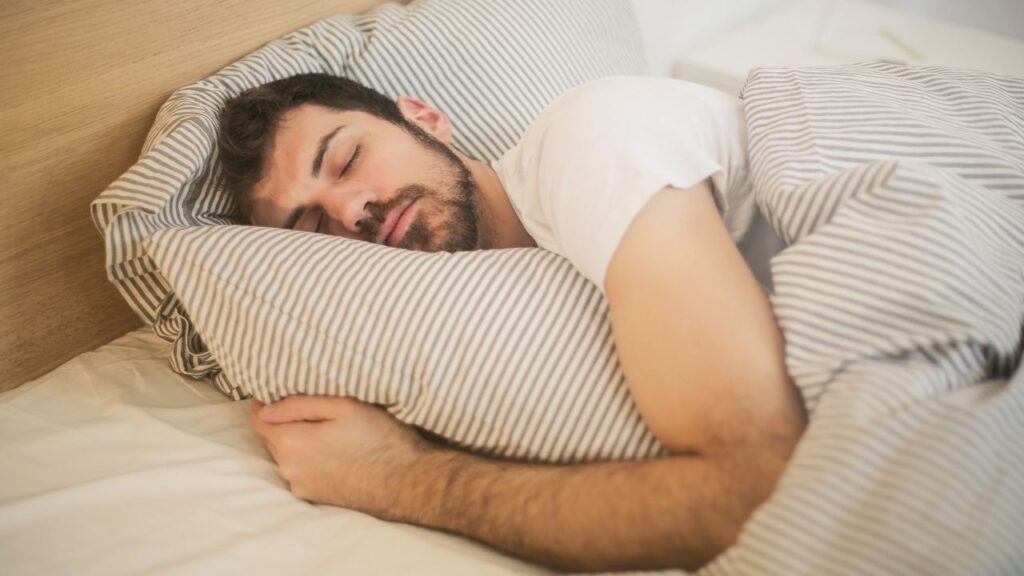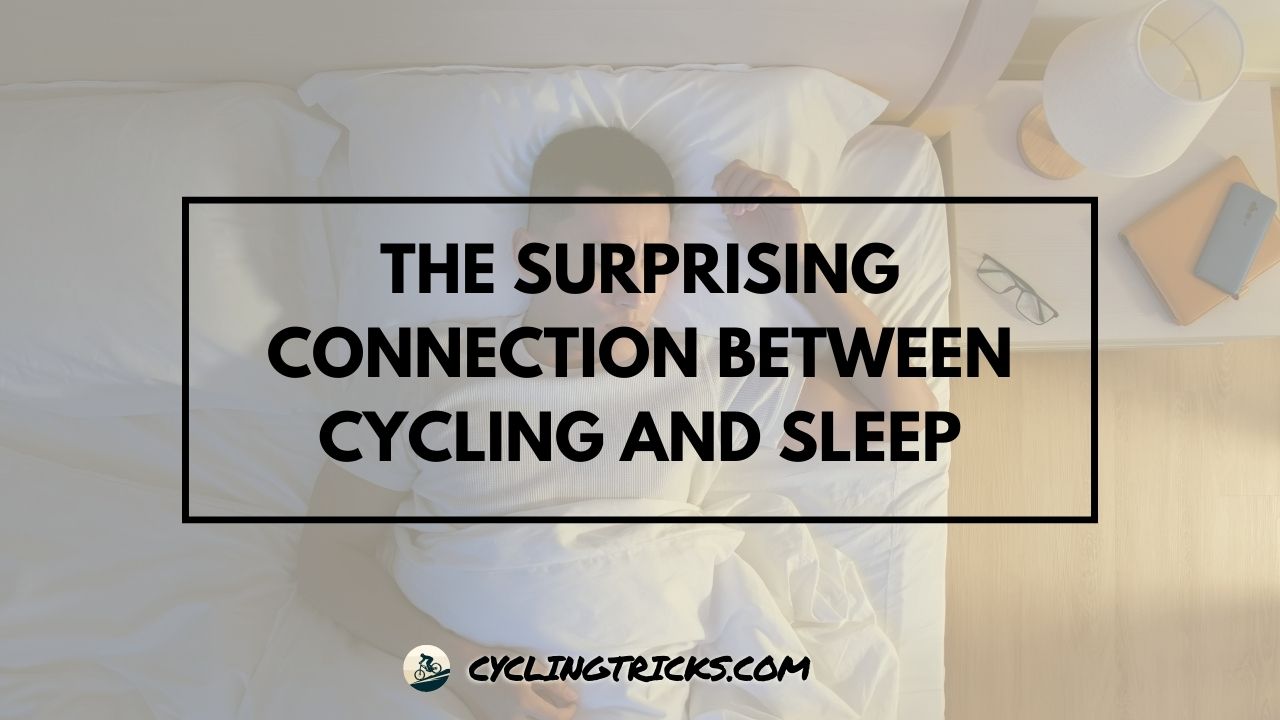As a keen cyclist and health and wellness fanatic, I’ve always known that the things we do for fun can have a big effect on our general health. But what I didn’t expect was the amazing link between riding and sleep.
According to research, cycling has many health benefits and can help you sleep naturally. After all, who would have thought that riding, which is fun and gives you energy, could help you sleep better?
This article is about the surprising ways that cycling can change the way we sleep and why you might want to add it to your routine. Cycling can help you sleep in so many surprising ways, from making your sleep better to making insomnia and other sleep problems less severe.
Let us look at the different ways that riding can help you sleep better and feel better all around.
So, what are the benefits of cycling for sleep, exactly? Let’s dive into the details.
The Importance of Sleep for Overall Well-being

Before we dive into how cycling can enhance our sleep patterns, let’s first understand the importance of sleep for our overall well-being. Quality sleep is crucial for our physical, mental, and emotional health. It affects our mood, energy, focus, and memory. Without proper sleep, we may experience fatigue, depression, and a weakened immune system.
Studies have shown that exercise, like cycling, can improve sleep quality. Regular physical activity promotes the release of endorphins, which help to reduce stress and anxiety. It also tires our bodies, making it easier to fall and stay asleep.
By incorporating cycling into our daily routine, we can enhance our sleep patterns, which, in turn, can positively impact various aspects of our lives. From better productivity to a happier mood, the benefits of quality sleep are endless.
Understanding Insomnia and Sleep Disorders
Lack of sleep and other sleep problems can make it very hard to get a good night’s rest. For example, insomnia is a common problem that millions of people have. Poor sleep can cause fatigue, irritability, and other health issues.
Cycling can help people who have trouble sleeping or can’t fall asleep get better. Adding cycling to your routine can help you sleep better by encouraging good sleep habits and relieving the signs of insomnia.
Being active every day has been shown to help balance sleep and wake cycles, which leads to a better, more restful sleep.
What Cycling Has to Do With Sleep Disorders
Some studies have found a strong link between riding and sleep problems.
A study in the Journal of Clinical Sleep Medicine found that people with chronic sleeplessness who cycled got better sleep and slept longer. People who peddled for 30 minutes, three times a week, were able to fall asleep much faster and stay asleep longer overall.
Cycling as a Way to Improve Your Sleep
Getting into the habit of riding is a good way to take care of your sleep because it helps you sleep better and more regularly. If you have sleep apnea or restless leg syndrome, riding can also help you sleep better. Bikers can take in fresh air and get more natural light when they go outside. This can help them sleep even better.
Cycling to Help with Sleeplessness
Cycling can be very helpful for people who have trouble sleeping. Cycling can calm the mind and get the body ready for sleep by lowering stress and making you feel more relaxed. Also, the physical activity of riding can raise endorphin levels, which can help people who are having trouble sleeping.
How Cycling Affects Sleep
Going for a bike ride is a great natural way to get better sleep. It not only encourages a healthier way of life, but it also has many physical and mental effects that help people sleep better.
For example, cycling can help relieve worry and anxiety, both of which can make it hard to sleep. Getting less stressed makes the mind and body calm down, which helps you fall asleep and stay asleep longer.
By exposing the body to sunlight, cycling also helps keep the body’s normal sleep-wake cycle in check. Sunlight is necessary for the body to make melatonin, a chemical that controls when you sleep and wake up and helps you fall asleep.
More serotonin and endorphins are made in the brain when you do regular exercise, like riding. These chemicals help control your mood and help you sleep better.
Cycling is good for your heart health, which makes it easier for the body to get oxygen and nutrients to all parts of it. This leads to better sleep and better health generally.
In summary, cycling has many benefits that can improve sleep quality. Regular cycling can help reduce stress and anxiety, regulate the sleep-wake cycle, improve mood, and promote better overall health.
The Science Behind the Connection
The surprising connection between cycling and sleep has been backed up by multiple scientific studies. Researchers have uncovered several ways in which cycling impacts sleep patterns, providing insights into why cycling can be an effective sleep aid.
Studies show that cycling can lead to an increase in the production of endorphins, helping to alleviate stress and promote relaxation. This is important as stress is one of the leading causes of disrupted sleep patterns.
Also, cycling can help keep our circadian rhythms in check, which is important for good sleep. The natural clock in our bodies is affected by light. When we ride our bikes outside, we are exposed to natural light, which can help us sleep better.
“The circadian system impacts sleep, hormone release, and various physiological functions. By regulating this system with cycling, we can greatly influence our quality of sleep”.
Not only does riding make us tired, but it can also raise our body temperature. Going to sleep faster and sleeping deeper and longer can be helped by this rise in temperature.
One Key Study’s Findings
In one study, researchers found that after cycling for 30 minutes, participants experienced a significant 21.9% increase in deep or slow-wave sleep. This stage of sleep is considered the most restorative, and a lack of it can lead to daytime fatigue and impaired cognitive function.
| Biking Group | Non-Exercise Group | |
|---|---|---|
| Slow-wave Sleep | 21.9% increase | 0% increase |
| REM Sleep | 8.5% increase | 0% increase |
| Wake Time After Sleep | 12-14 mins | N/A |
As this study shows, cycling can have a significant impact on sleep patterns. It can help improve the length and quality of sleep, and specifically promote deep or slow-wave sleep.
By understanding the scientific research behind the connection between cycling and sleep, we can feel confident in the ability of cycling to improve our sleep hygiene and promote overall well-being.
Cycling as a Natural Sleep Aid
Some people find that riding helps them fall asleep and stay asleep. If this sounds like you, it might be a natural way to get the rest you need. Cycling is a good way to get some exercise, be outside, and release endorphins, all of which can help you sleep better and keep your sleep health in general.
Cycling has been demonstrated to improve nighttime deep- and slow-wave sleep. Deep sleep helps you wake up refreshed, while slow-wave sleep helps you learn and recall.
What Happens When You’re Around Natural Light
The natural light that comes in when you ride your bike outside helps your body’s clock work better and wakes you up in the morning. Your body makes more melatonin when it sees natural light. This hormone helps your body tell the difference between day and night thus controlling when you sleep and wake up.
Being around natural light also helps keep your circadian rhythm in balance. This rhythm controls many body functions, such as hormone production, sleep, and digestion. Your circadian rhythm can get back in line if you ride your bike outside. This can help you sleep better.
The Flow of Endorphins
The body makes endorphins when you ride a bike, which make you feel good and reduce stress naturally. The release of hormones also helps keep your mood in check, which makes you feel calmer and more ready to sleep. Cycling can help you fall asleep faster and stay asleep longer by lowering your stress.
How to Get Better Sleep by Cycling
If you want to get the most out of cycling as a natural way to help you sleep, you should make sure you follow the right plan. If you want to ride your bike, try to do it early in the day. Working out in the late afternoon or evening may make it harder to sleep.
Also, try to avoid riding in places that are too stimulating or stressful. Last but not least, pay attention to your body and ride your bike at a speed that feels good to you.
Tips for Incorporating Cycling into Your Sleep Routine
If you’re looking for a natural way to enhance your sleep patterns, cycling might be just what you need. Here are some practical tips for incorporating cycling into your sleep routine:
Create a Schedule
Scheduling your rides can help make cycling a regular part of your routine. Decide on the time and duration of your rides, and stick to your schedule as much as possible.
Optimize Timing
Riding in the morning or afternoon can be beneficial for better sleep. Avoid cycling close to bedtime, as the physical and mental stimulation can keep you awake.
Find a Supportive Environment
Cycling in a peaceful and quiet environment can help you relax and prepare for restful sleep. Consider riding in a park or on a bike path away from busy roads.
Gradually Increase Intensity
Start out slowly and build up the energy of your rides over time. This can help your body get used to the physical demands of riding and keep you from working out too hard, which can make it harder to sleep.
Listen to Your Body
Pay attention to your body’s cues and adjust your riding schedule accordingly. If you’re feeling overly fatigued or experiencing pain, take a break and allow your body to rest and recover.
If you follow these tips, you can make cycling a part of your sleep schedule and enjoy all the health and sleep benefits it offers.
Cycling and Lifestyle Factors that Can Impact Sleep
Making changes to how we live can have a big effect on how well we sleep. Some of the things that can affect our sleep habits are having stressful jobs, not being active enough, and not eating well. However, did you know that riding can help lower some of these risks and encourage good sleep habits?
Cycling regularly, along with other types of exercise, can help lower stress and improve health in general. Studies have shown that exercise is one of the best ways to deal with stress, which is a major cause of sleeplessness and other sleep problems. Integrating riding into your daily routine can help you feel less stressed and sleep better.
Cycling for health help you feel less stressed and improve your overall fitness. You can stay at a healthy weight and lower your chance of getting chronic diseases by working out regularly. Having good health can help you sleep better, making it easier to fall asleep and stay asleep all night.
Also, riding a bike with family and friends can be a fun and interesting thing to do. You can improve your social connections and feel less alone or isolated by spending time outside and doing a group exercise. These things can also affect the quality of your sleep.
On the whole, cycling has many health perks that can help you sleep better. You can lower your stress, improve your health, and enjoy the benefits of a good night’s sleep by making cycling a part of your schedule.
Other Sleep Hygiene Practices to Consider
Cycling can help you sleep better, but there are other things that can cause sleep problems and insomnia as well. Adding in other sleep hygiene habits can help add to the benefits of riding and make your plan for better sleep more complete.
Setting a normal sleep schedule is a good habit to get into. Regularly going to bed and getting up can help your body set up a natural sleep rhythm that makes it easier to fall asleep and stay asleep.
Creating a sleep-friendly environment is crucial. This may involve quieting the bedroom, adjusting the temperature, and using soft blankets and pillows to help you sleep.
Also, think about making a relaxing habit for before bed. This could include things like deep breathing, meditation, or a warm bath to help you relax and get your body and mind ready for sleep.
Sleep Hygiene Practices to Consider
| Practice | Description |
|---|---|
| Establishing a Regular Sleep Routine | Going to bed and waking up at consistent times to establish a natural sleep rhythm. |
| Creating a Sleep-Conducive Environment | Reducing noise and light pollution, ensuring comfortable temperature, and using comfortable bedding and pillows to create a relaxing sleep surface. |
| Relaxing Pre-Sleep Routine | Activities such as meditation, deep breathing exercises, or taking a warm bath to help unwind and prepare the mind and body for sleep. |
Besides cycling, you can improve your sleep habit and get all the benefits of a good night’s rest by adding other sleep hygiene practices.
Tracking and Monitoring Sleep Quality
To enhance the benefits of cycling on sleep, it’s crucial to track and monitor your sleep quality. This will help you assess how your sleep patterns are changing and identify areas for improvement. Here are some effective methods and tools you can use:
- Sleep tracking apps: There are many great apps available for tracking your sleep. These apps use your phone’s sensors and microphone to monitor your sleep cycles, and provide detailed data on factors such as sleep duration, sleep quality, and REM sleep.
- Sleep diary: Keeping a sleep diary can be an effective way to track your sleep quality over time. Simply record the time you went to bed and woke up, and any factors that may have affected your sleep, such as exercise, diet, or stress. Over time, you’ll be able to identify patterns and make adjustments accordingly.
- Smartwatch: Many smartwatches come with built-in sleep tracking features, allowing you to monitor your sleep patterns without needing an additional device. Some smartwatches can even track your heart rate and movements during sleep, providing more detailed data on your sleep quality.
You can learn a lot about how cycling is changing your sleep habits by keeping track of and monitoring the quality of your sleep. Then, you can change your cycle schedule to help you sleep better.
For example, you could start cycling earlier in the day, ride farther, or make your rides less intense.
Conclusion
As I explained in this article, the strange connection between cycling and sleep can be very good for our health in many ways. Cycling can help you sleep naturally, help you develop good sleep habits, and make your sleep better.
By cycling daily, we can lower our stress, improve our health, and feel good about ourselves and our achievements. Keep in mind that cycling is only one part of a complete plan for good sleep habits. Other things, like making your bedroom more comfy, limiting your caffeine intake, and learning how to relax, can also help you sleep better.
So, if you want to sleep better and feel better in general, try riding! You can easily add this fun, low-impact exercise to your daily life. Cycling can help you get in shape and sleep better, whether you like a slow ride through the park or a hard sprint training session.
Thank you for reading, and have fun riding your bike!









